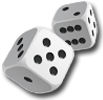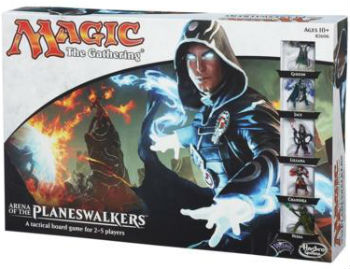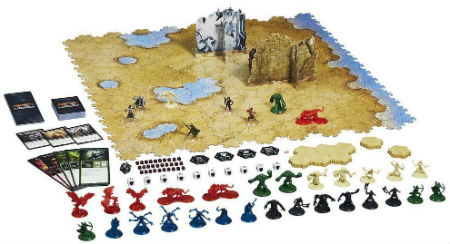



play board games
Board game reviews, strategy tips & session reports
Magic the Gathering Arena of the Planeswalkers Review
 Stats:
Stats:
No. of players: 2-4
Amount of time to play: 30-45 min
Age requirements: 10+
Set-up time: 5 min
Magic the Gathering Arena of the Planeswalkers pits two or more wizards from the Magic universe against each other in a miniatures skirmish game.
Arena of the Planeswalkers Rules Description:
Magic the Gathering Arena of the Planeswalkers is played on 3d hex-based map. It plays similarly to Heroscape but you must summon your squads and you can cast spells.
Each Planeswalker is associated with a specific color of mana. After you pick your Planeswalker you take their associated squads and deck of spell cards. The scenario shows you how to setup the board and where you may deploy your Planeswalker. Different scenarios have a unique win condition and number of turns.
You start the game with three spell cards. On your turn you draw a spell and then may activate one hero or squad. When you activate a unit it may move then attack. If you activate your Planeswalker they may summon a squad up to four hexes away.
A unit’s army card will give you its stats and any special abilities it can use. You move based in the unit’s movement stat. Moving up elevated terrain costs extra and if you move into water you must stop. You do not attack until the entire squad is done moving.
To resolve combat you and the defender roll a certain number of dice based on their unit’s attack and defense stats. You land a hit for each sword you roll and then a hit is removed for each shield the defender rolls. Any remainder counts as a wound against the defending unit. If a unit has no health remaining it is destroyed and removed from the board. Some circumstances can grant the attacker or defender bonuses that let them roll extra dice.
There are different kinds of spells. Enchantments are attached to an army card. Some enchantments are hidden and played face down on an army card. These enchantments are flipped over and resolved when specific conditions are met. Other sorcery spells are resolved as soon as they are cast.
The player that meets the scenario’s win condition first wins the game.

Quick Review of Arena of the Planeswalkers:
Magic the Gathering Arena of the Planeswalkers is a fun miniatures skirmish game. It is easy to teach and very kid friendly too.
The components are well made and look very nice. The art and miniatures are well done. There is not as much 3d terrain as in the original Heroscape and the board does not require much set up. This makes it easier to get on and off the table. The rules are easy to follow and full of examples.
I like that each faction plays differently just like in Magic the card game. This keeps the theme and setting intact and adds to the games replay value.
This game begs for expansions. And they will make army building possible which will increase the strategy. You’ll need to make decisions before the game even starts.
There are a couple things to beware of with Arena of the Planeswalkers. Between the dice and cards iIt can be pretty random. Also some spells effect only creatures and not Planeswalkers. So be sure to read the spell cards and special abilities carefully.
Another difference from Heroscape is the lack of turn markers. You can use the same unit over and over again. This gives you more flexibility, but takes some of the strategy of planning your turn away. This can be easily rectified if you have turn markers from the Heroscape or you could make your own.
Also some squad units have more than one life. This can create issue when marking a specific unit’s damage. This is not too hard to handle but it would be nice to have an easier way to track an individual unit’s health.
Magic the Gathering Arena of the Planeswalkers feels like a starter set. I wish it had more scenarios. But like I said above if this gets expansions the strategy and fun will grow with the game. If you this sounds like a game your group would enjoy pick it up. It is also very accessible and great for families.
Score and synopsis: (Click here for an explanation of these review categories.)
Strategy 3 out of 6
Luck 5 out of 6
Player Interaction 6 out of 6
Replay Value 4 out of 6
Complexity 3 out of 6
Fun 4 out of 6
Overall 4 out of 6

Leave a Reply